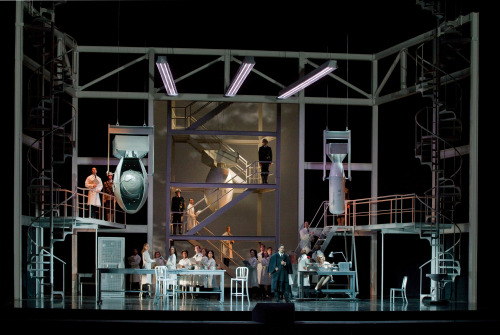NEW YORK (AP) ― A debuting Swedish soprano and a cartwheeling Roberto Alagna took over leading roles as Des McAnuff’s atomic-scientist production of Gounod’s “Faust” continued its run at the Metropolitan Opera.
As Marguerite, the maiden seduced and abandoned by Faust, Malin Bystrom got off to a slow start Friday night with a muted “King of Thule” song and a jewel aria that was too soft-grained to sparkle.
But she improved as the evening wore on, bringing pathos to the spinning song, desperation to the church scene and gleaming tone to the heavenly trio that ends the opera. Bystrom attacked a few of her top notes too aggressively for comfort, but overall she sounded like an artist with a lot to offer. And she acted with sensitivity, giving poignant shape to the opera’s only three-dimensional character.
 |
A scene from Charles Gounod’s ‘Faust’ at New York’s Metropolitan Opera. (Metropolitan Opera) |
Alagna, who has now sung in three different production of “Faust” at the Met, didn’t bother much with acting, relying on boyish charm rather than subtlety. He began the evening his usual exuberant self, even ― somewhat inappropriately ― performing his acrobatic stunt just after Mephistopheles restores his youth.
His bright, focused tenor sounded in decent shape, except for some stress in the upper register. It was a surprise when a Met official came out between scenes in the last act to announce that Alagna was not feeling well, but he made it through to the end.
A third newcomer to the production was baritone Brian Mulligan as Marguerite’s unforgiving brother, Valentin. He brought burnished tone and deep feeling to his famous aria, “Avant de quitter ses lieux,” then came close to stealing the entire show with a death scene that was riveting in its raw intensity.
All three fit with ease into McAnuff’s staging, which is well thought-out in its details, even if the notion of Faust as inventor of the atom bomb seems as contrived as ever.
Still in the cast from opening night were bass Rene Pape as the most debonair Mephistopheles imaginable and mezzo-soprano Michele Losier as an ardent Siebel. Conductor Yannick Nezet-Seguin again worked magic by making Gounod’s sentimental score sound fresh and even, at times, profound.








![[Herald Interview] How Gopizza got big in India](http://res.heraldm.com/phpwas/restmb_idxmake.php?idx=644&simg=/content/image/2024/11/20/20241120050057_0.jpg)